It was the year 192 B.C. when an Aetolian army entered Sparta. He did not arrive as an invader but as an ally, after a request for help made by the Spartan king Nabis to make up for the state of weakness in which the country had been left after the defeat before a coalition of Romans, Macedonians and Achaeans. However, during a joint drill, the Aetolian general Alexamenos turned on Nabis and killed him. In this way he put an end to the monarchy in Sparta, to its independence and to the unusual social revolution that the sovereign had developed.
Nabis has not only gone down in history as the last Spartan king but also for being a very unique character, a man who led a real social and economic upheaval by expropriating the properties of the upper classes to distribute them among the common people, as well as abolishing his debts. Also, he freed all the duloi (slaves) and gave them in marriage to the wives and daughters of the exiled masters of him. A policy so unusual in antiquity that, combined with his oscillating position in foreign affairs, it earned him the enmity of much of Greece.
And it is that Nabis had broken the Laconian tradition of the diarchy, that is, the two-headed monarchy, by having himself proclaimed as sole king in the year 199 BC. He succeeded the tyrant Macanidas, a bodyguard of Pelops, the last monarch of the Eurypontid dynasty; since the king was still a child, he could not rule per se and he had to submit to a regency that Macanidas assumed. But he died fighting the Achaean League at the battle of Mantinea (not to be confused with the other two namesakes above) and the next regent was Pelops's tutor, Nabis. Soon after, whether by chance or not, the young sovereign died and Nabis seized power alone, supported by an army of mercenaries.
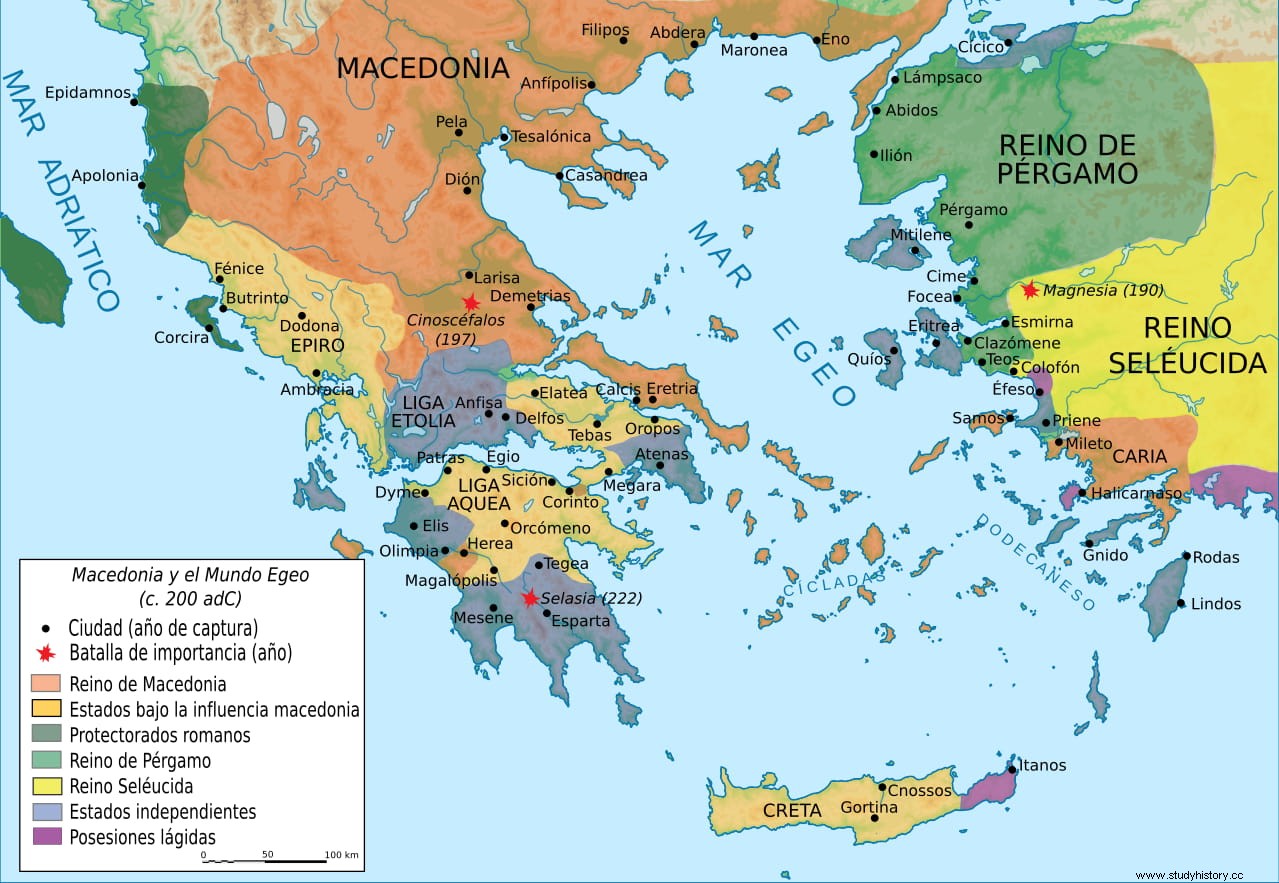
To save face and link to the reigning dynasty up to that time, he claimed to be a descendant of Demaratus, King Eurypontida who had occupied the throne a long time ago, between 515 and 491 BC, and who has a certain fame because after being deposed he took refuge at the Persian court, participating in Xerxes' proclamation to Artabazanes and advising him not to underestimate the Spartans in the run-up to the battle of Thermopylae (as we know, Xerxes ignored him and unexpected resistance was met).
The ascension of Nabis to the throne was favored by the situation of political decomposition suffered by Sparta after the defeat of Cleomenes III (of the Agiada dynasty but linked by marriage to the Eurypontida), a reformist overthrown after his defeat in the war that leads his name, before the Achaean League and Macedonia. Cleomenes III died trying to recover the crown from him and a power vacuum arose that forced Sparta to designate a child as heir; was the aforementioned Pelops. Now it was the turn of Nabis, whose lack of certainty in the lineage caused many historians of the time to despise him as a simple usurper.
Indeed, authors such as Tito Livio and Polibio call him a tyrant and are manifestly hostile in his works; "a multitude of murderers, thieves, thieves and highwaymen «, Defines the second in the Stories of him to the mercenary army of Nabis. He himself would have to make an effort to deny that condition in a letter to the Roman general Titus Quincio Flamininus, but, above all, by minting coins in which he named himself basileus . This is how it appears in an inscription in the sanctuary of Delos, as Livio himself recognizes in his Roman History , indicating that his legitimacy ended up being accepted in some way.
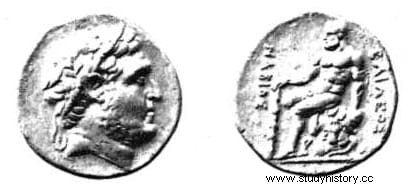
It was probably influenced by the fact that, in the face of this elite opposition, Nabis was a king with considerable popular support. It was the result of the generosity that he always showed, albeit interested:he needed funds to be able to pay the mercenaries who supported him, so he resumed the reformist program initiated by Cleomenes III (and before that by Agis IV), only taking it to the extreme and applying it without scruples; if he had to resort to violence, he did it, and Polibio and Tito Livio were careful to underline it:they say that he used to convince the wealthy to pay by threatening to send them to negotiate with his wife.
It was a subtle irony. Nabis was married to Apega (or Apia) and her traits were incorporated into a female-looking automaton that has gone down in history as Apega of Nabis . Using devices, he closed her arms around the victim and pressed her against her torso, with the peculiarity that her body was bristling with spikes; she was, then, a kind of primal version of the iron maiden. Something that contributed to creating an absolutely negative image of Apega, which the classics compared to Pandora, Cleopatra and Arsinoe. Of course, it is difficult to establish exactly how much truth and how much fantasy in all this, given that the iron maiden is also considered a romantic invention of the 19th century.
In any case, the polis under the rule of Nabis and Apega experienced a strong shake. The large estates they confiscated from wealthy families were distributed among the freed helots, who were inevitably loyal to them because they had broken the customary law that forbade their release; on the other hand, they freed the slaves (whose condition was different from that of the helots), probably because they were scarce in Laconia and legally only the homoioi could own them. , not the periecos, incorporating everyone into the census and granting them land. To accentuate his policy, the wives and daughters of the rich who chose exile were given to these new citizens as wives.
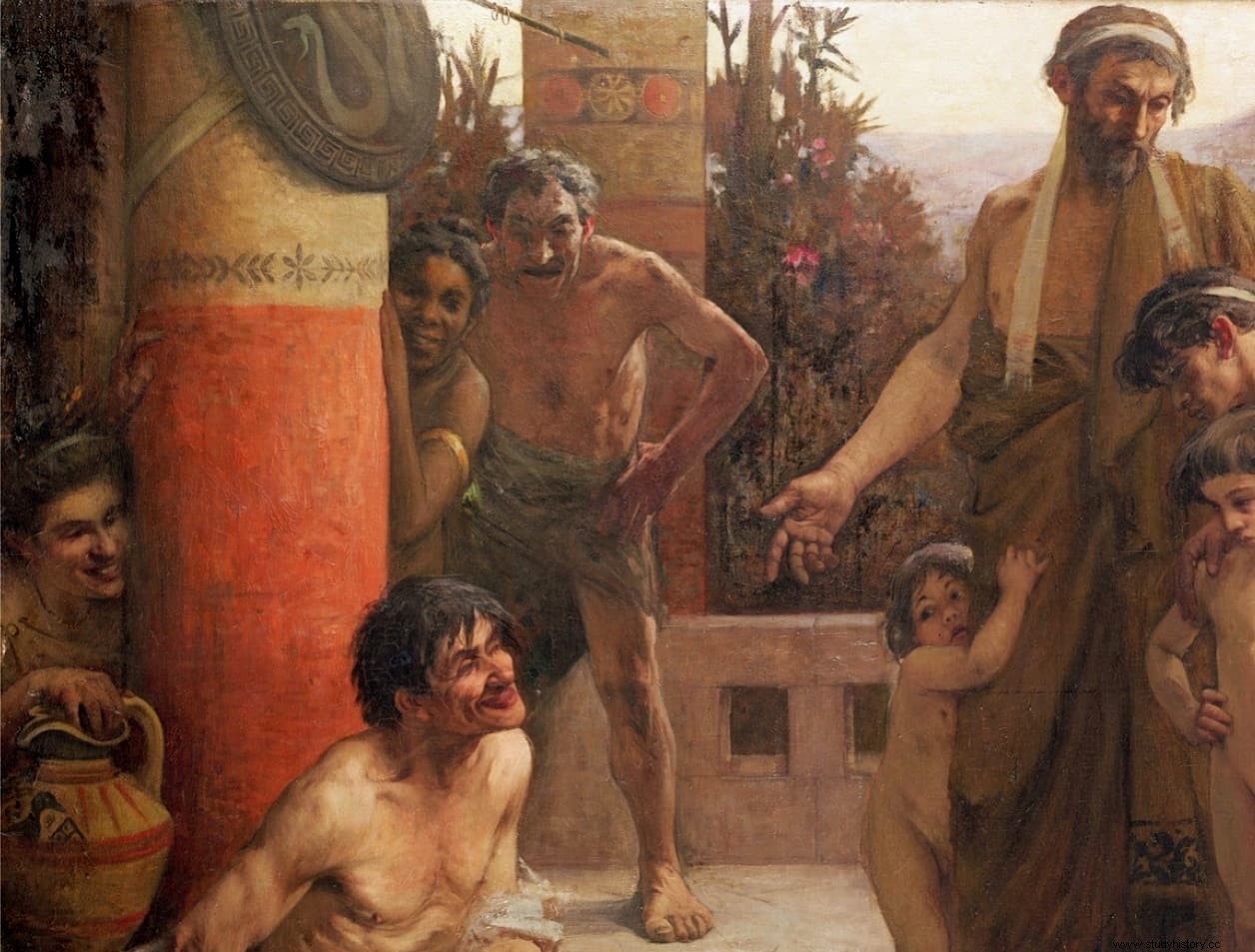
All this provided Nabis with a greater number of favorable citizens, which allowed him to convene them in an assembly to avoid opposition from the gerusía (council of elders) and the ephors (magistrates), the government control bodies. Then, with his hands free and the profits obtained, he was able to undertake his great objective:recompose the historical Spartan military power and aspire again to that hegemony that it enjoyed at the beginning of the 4th century BC, after imposing itself on Athens in the Peloponnesian Wars.
Sparta had been losing that supremacy, first at the hands of Thebes, then Macedonia and finally Rome. In 205 BC, Nabis signed the Treaty of Phoenix, which made the Romans his allies against the Macedonians and the Greek territories that were under their orbit. The following year he clashed with the Achaean League and invaded Messenia, once his domain. Philopemen, Arcadian strategist of the League, defeated him at Tegea, forcing him to return it and making it clear that Sparta was not yet ready for great aspirations.
The interior reforms that we have seen gave him the money and time he needed to get a powerful army - made up of Cretan pirates and coastal periecos, according to Tito Livio - and build almost ten kilometers of wall around the city (until then, the walls they were almost testimonial because they had always relied on the skill of the hoplites for defense). The Achaean League detected the danger and in 197 B.C. allied himself with Rome; Since one of its members was Achaia, Sparta's main rival, Nabis decided in turn to approach Philip V of Macedon. He rewarded him by giving him Argos, the hometown of his wife Apega, to whom he entrusted his government.
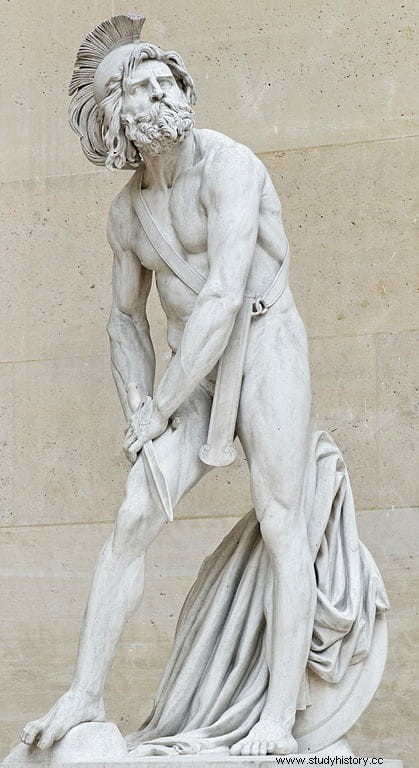
When the war turned against the Macedonians, Nabis again changed sides and even provided the Romans with a contingent of six hundred Cretan mercenaries. Philip V's defeat at the battle of Cynoscephalae sealed the end of the war:the Roman Republic occupied much of Greece and Sparta held Argos. Nabis continued to reform it, building a naval arsenal at Gythion and opening its ports for Cretan pirates to operate from. His fleet continued to grow and to meet the demand for oarsmen he admitted poor citizens, historically vetoed until then, to the position.
Actually, it was not an exclusively naval opening. Previous impoverishment had caused many homoioi or Spartans (full-right citizens) could not pay the sisitia (collective banquets of Dorian societies), which deprived them of citizenship, becoming hypomeions (demoted Spartans). Consequently, they also had no money to be hoplites and the available number of hoplites had drastically decreased, already forcing King Cleomenes III to increase the number of auxiliary troops based on periecos and helots, as well as to form light phalanxes, Macedonian style. But many fell in the battle of Sellasia and others went into exile in the face of Nabis's confiscatory policy, so the problem persisted.
The revolutionary monarch decided to solve it by creating a new social class, that of the neodamodes , formed by freed and loyal helots, who would be enriched and could equip themselves and fight as heavy hoplites. By the way, moreover, helotism was ending, a traditional brake on expansion for fear of an insurrection in the rear. All this put the Romans on alert, to whom the Achaean League was already warning against Sparta, annoyed by the fact that one of its members, Argos, had remained in their power. Thus, in 195 BC, the Roman general Titus Quincio Flamininus put his allies to a vote on what to do with the Spartans; except the Aetolian League and Thessaly, all voted for war.
The casus belli deliberately provoked was an ultimatum to Nabis to return Argos, which he refused. Then an allied army of forty thousand men entered the Peloponnese and joined with another Achaean of eleven thousand to march on Argos, defended by a garrison of fifteen thousand under Pythagoras, brother of Apega. There was an attempt at internal rebellion that failed, but the city was not besieged because, despite the contrary opinion of the other Greek leaders, Flamininus preferred to attack Sparta directly, where Nabis was barely able to gather ten thousand soldiers plus three thousand mercenaries and two thousand of Cretans.
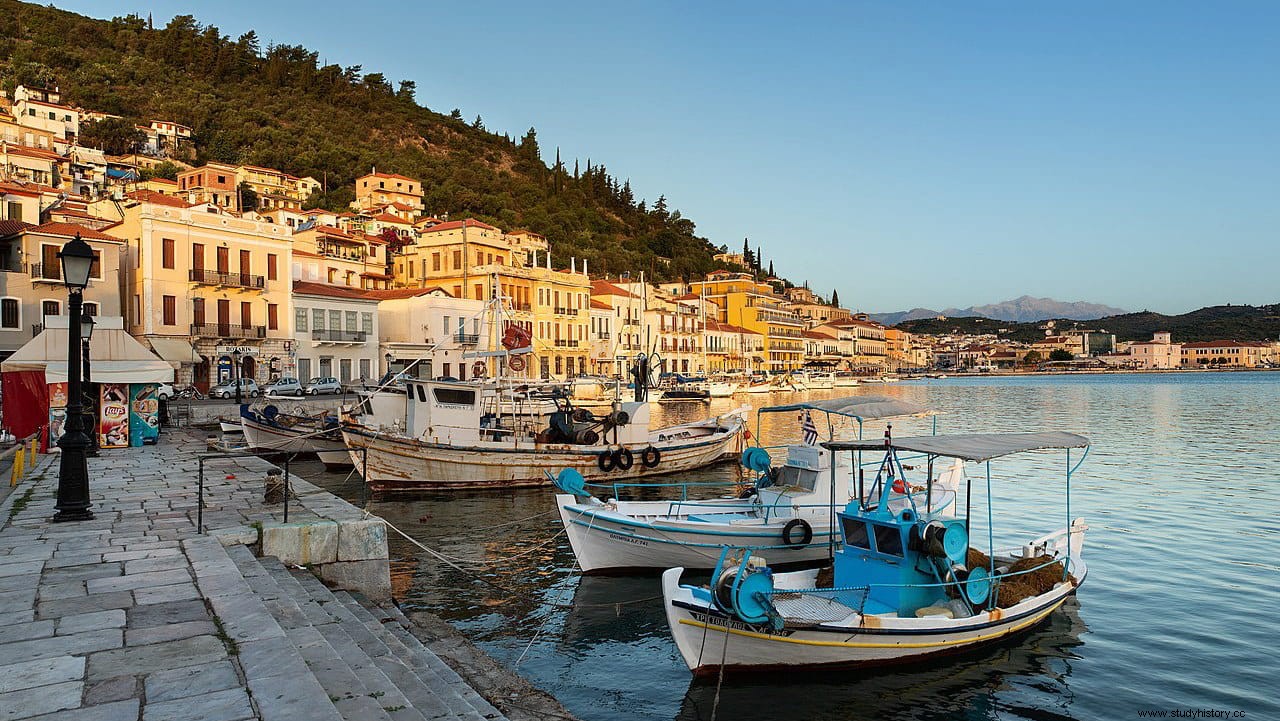
In addition to his troops, Flamininus had the adherence of exiled Spartans, including Agesipolis III, the legitimate king overthrown years ago by the first tyrant, Lycurgus (not to be confused with the famous legislator of the same name). Likewise, a Roman fleet of forty ships under the command of Lucius Quintus Flamininus arrived by sea, and another of twenty from Rhodes, an island fed up with Cretan piracy. Finally, they were joined by another forty ships from Pergamon, whose king, Eumenes II, was interested in Roman collaboration for fear of an invasion by the Seleucid Antiochus III of Syria.
During the advance through Laconia there was an exchange of blows, but the coalition forces went ahead and laid siege to Gythion, whose commanders clashed with each other as one favored surrender, Dexagoridas, and another resisted, Gorgopas, assassinating the latter. to the first. The resistance was fierce but, in the end, Gorgopas had to negotiate the delivery of the place in exchange for being able to retire with his men to Sparta. The capital would thus see the number of defenders increase -to which three thousand Argives led by Pythagoras were added-, but Nabis lost his fleet and with it the maritime domain.
He then agreed to parley with Flamininus, to whom he offered to return Argos and the prisoners he had taken. The proposal was rejected and, in exchange, there was a counter offer to reach a six-month truce:surrender Argos and the fleet, pay an indemnity for eight years and break his alliance with Crete. Nabis also refused, trusting that he had provisions aplenty to hold out, and the dispute returned to the battlefield. Flamininus, aware that he could not surrender Sparta by hunger, launched an assault and little by little the defenses gave way. The legionnaires attempted to breach and enter, first being hampered by narrow streets and fires set by Pythagoras, which forced them to retreat.
However, the Romans returned and the Spartan line began to crumble. Nabis sent his brother-in-law to parley, but Flamininus stood by the conditions already set forth and had to accept them. The news reached Argos, which also laid down its arms and rejoined the Achaean League, whose representatives saw with regret how the Romans did not depose the Spartan king but kept him as a counterweight in Greece (in return he had to send Rome to his son Armenas, as a hostage). They also did not allow the exiles to return, although they did allow their women to join them, leaving the helots they had been forced to marry.
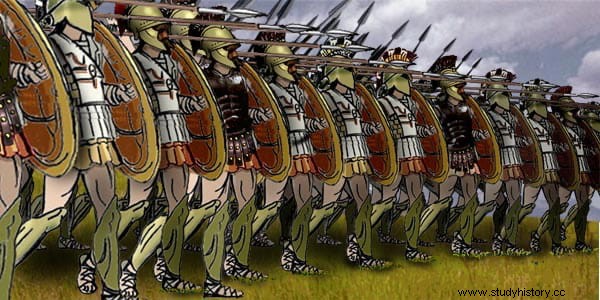
As soon as the legions left Greek territory, Nabis resumed the construction of his fleet and army. In 192 BC, encouraged by the Aetolians, opposed to the Roman presence, he reconquered Gythion. The Achaean league quickly requested help from Rome, which sent a fleet led by the praetor Attilius and a column commanded, again, by Flamininus. At the same time, the Achaeans sent a squad that was defeated by the Spartans while the strategist Philopemen was also unable to prevail by land and had to withdraw. But he returned and finally forced his enemy to barricade himself in the city while his men camped in Laconia.
Flaminino's arrival returned things to the state before his departure. Nabis gave in again... and reoffended as soon as his opponents left, resuming his plans but now with other allies:Antiochus III and the Aetolian League, which sent a contingent of a thousand troops and thirty horsemen to train together. to the Spartans. However, as we saw at the beginning, General Alexameno had the secret order of the Aetolian strategos Damocritus to finish off Nabis, probably because the former was suspicious of the other's empathy with Rome (despite being enemies) and aspired to liberate the Laconians from his tyranny, according to Tito Livio. A surprise lance knocked him off his horse and he was finished off on the ground by the other riders.
They then made the mistake of sacking the palace and Sparta itself, instead of explaining his action, causing the people to rise up, kill Alexamenos, and expel the Aetolians who did not fall with him. Shortly after, Philopemen arrived, who did act with skill:he put order over the anarchy in which everything had been left and incorporated Laconia into the Achaean League, proscribing the monarchy forever. In 189 BC, the announcement that the exiles might return sparked a last Spartan attempt to secede from the league; It ended up crushed and meant the inexorable end of its wall, its laws and, in short, its independence. Roma attended all this without intervening, rubbing his hands.
